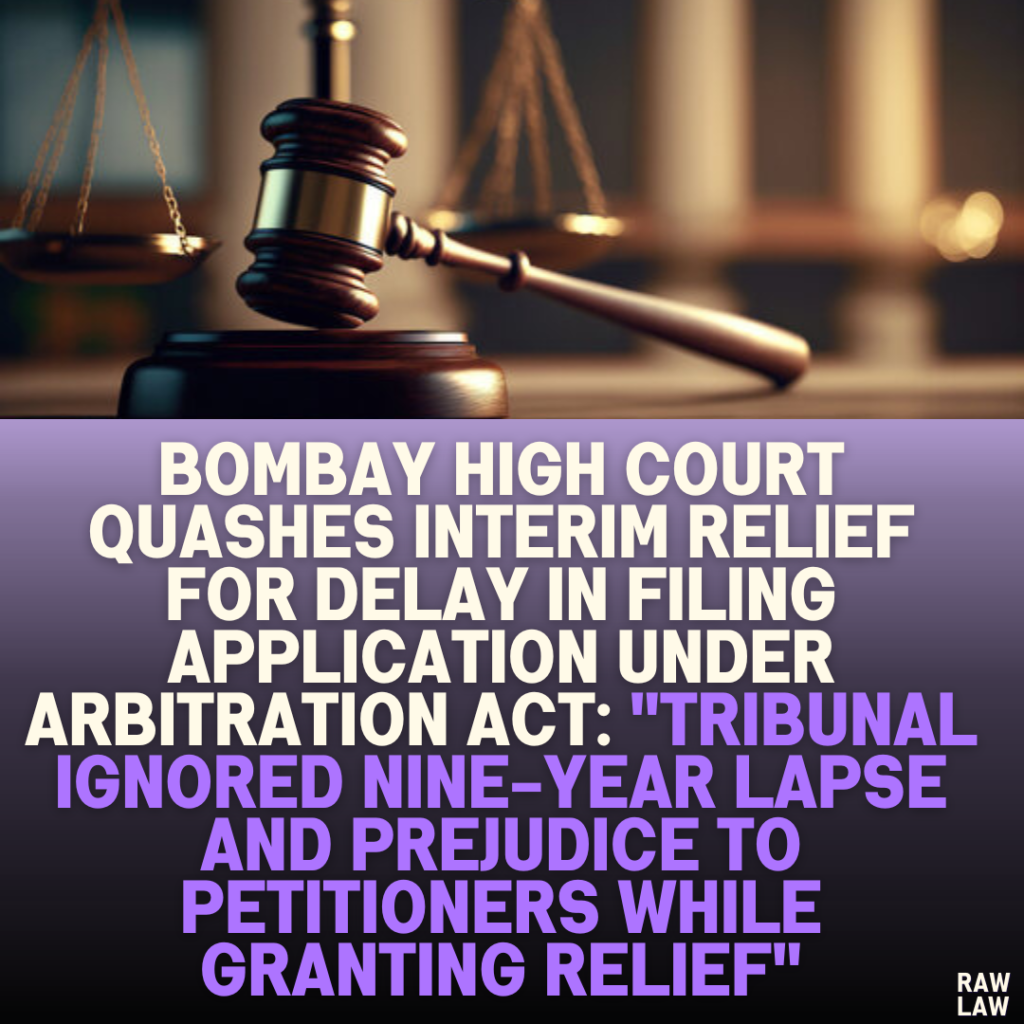Court’s Decision:
The Bombay High Court quashed the arbitral tribunal’s interim order granting relief to the respondents under Section 17 of the Arbitration and Conciliation Act, 1996. The court held that the reliefs were granted without adequately addressing the issue of delay and laches in filing the application, causing undue prejudice to the petitioners.
Facts:
- Ownership and Agreements:
- The petitioners were the owners of a parcel of land in Thane.
- In 2009, the petitioners sublicensed the land to the respondents for a development project under a set of agreements.
- Termination of Agreements:
- In 2015, the petitioners issued a termination notice citing breaches of the agreements by the respondents.
- The respondents did not respond within the stipulated 30 days, leading to the petitioners’ assertion that the agreements were terminated.
- Disputes and Arbitration:
- The respondents contested the termination and invoked arbitration in 2019. They filed a Section 9 petition seeking an injunction, which was dismissed in 2020.
- A statement of claim was filed in 2022, and an application under Section 17 was filed in 2024, seeking financial disclosures and escrow arrangements for sale proceeds.
Issues:
- Delay in Filing Application:
- Was the respondents’ delay of nearly nine years from the termination of the agreements and over two years after filing the statement of claim justified?
- Did the tribunal err in overlooking this delay?
- Validity of Reliefs Granted:
- Were the interim reliefs, such as financial disclosures and depositing sale proceeds in an escrow account, justified under the circumstances?
- Burden of Proof:
- Did the tribunal improperly reverse the burden of proof while adjudicating the application?
Petitioner’s Arguments:
- Delay and Prejudice:
- The respondents showed no valid justification for their delay in filing the Section 17 application, which prejudiced the petitioners.
- The tribunal’s application of Section 14 of the Limitation Act to justify the delay was erroneous and not based on proper reasoning.
- Impact on Project and Regulatory Compliance:
- The reliefs imposed financial hardship, threatening the continuation of the project.
- As promoters under RERA, the petitioners were required to deposit 70% of proceeds in a designated account, leaving them with limited cash flow to meet operational costs.
- Improper Adjudication:
- The tribunal conducted a “mini-trial” on the validity of the agreement’s termination, which was impermissible at the interim stage.
- The reliefs granted were akin to an attachment before judgment under Order 38 Rule 5 of the CPC, requiring stricter compliance, which was absent.
- Reversal of Burden of Proof:
- The tribunal wrongly shifted the burden to the petitioners to prove they could satisfy any potential award, rather than requiring the respondents to substantiate their claims.
Respondent’s Arguments:
- Justification for Delay:
- The delay was due to the prolonged litigation history and was adequately explained.
- Mere delay does not disentitle a party from seeking interim relief unless prejudice is shown.
- Protection of Rights:
- The interim reliefs were limited and essential to protect their 58% share in the project as per the agreements.
- The petitioners’ conduct—selling flats at undervalued prices and failing to disclose transactions—necessitated the reliefs.
- Scope of Appellate Review:
- Under Section 37 of the Arbitration Act, the High Court’s scope of interference with the tribunal’s discretionary order is limited to cases of perversity or procedural irregularity.
Analysis of the Law:
1. Delay and Laches:
- The court emphasized that delays must be adequately explained, especially when seeking equitable interim relief.
- The tribunal failed to address the delay of nearly nine years since the termination of the agreements and seven years since the disputes arose.
2. Principles for Interim Relief:
- Reliefs under Section 17 must balance the rights of both parties and consider the potential prejudice caused to the opposing party.
- The tribunal overlooked the petitioners’ arguments on financial hardship and the impact on third-party purchasers.
3. Precedents and Comparisons:
- The court distinguished the cases cited by the respondents, noting that they involved lesser delays and different factual contexts.
- Reliance on cases like Raman Tech vs. Solanki Traders underscored that attachment-like orders require stricter proof of malafides or dissipation of assets.
4. Burden of Proof:
- The respondents failed to provide evidence of their entitlement to relief, yet the tribunal imposed disclosure and deposit obligations on the petitioners.
Court’s Reasoning:
- Delay Unjustified:
- The tribunal wrongly justified the delay using Section 14 of the Limitation Act without addressing its applicability to the facts.
- Financial and Procedural Prejudice:
- The reliefs imposed financial and regulatory burdens on the petitioners, adversely affecting their ability to continue the project.
- Improper Conduct of Tribunal:
- Conducting a “mini-trial” on the validity of the termination and reversing the burden of proof at the interim stage were procedural errors.
Conclusion:
The Bombay High Court quashed the tribunal’s interim order, emphasizing that granting relief without addressing procedural delays and balancing the parties’ interests results in injustice. It highlighted the need for tribunals to substantiate interim orders with cogent reasoning.
Implications:
- Judicial Oversight in Arbitration:
- This decision reaffirms that courts will intervene in arbitration proceedings to rectify procedural and substantive errors.
- Equity and Procedural Discipline:
- The ruling underscores that parties seeking interim relief must demonstrate diligence and substantiate their claims without shifting the burden of proof.
- Balancing Interests:
- Tribunals must balance the rights of both parties when granting interim relief, avoiding undue hardship to any party.




Pingback: Supreme Court Observes, "Suspicious Circumstances Must Be Resolved Before Declaring a Will Genuine"; Emphasizes Distinction Between Validity and Genuineness, Remands Case to Bombay High Court for Fresh Consideration - Raw Law